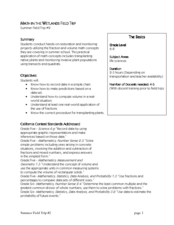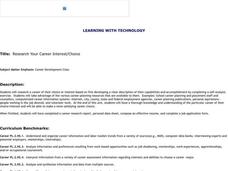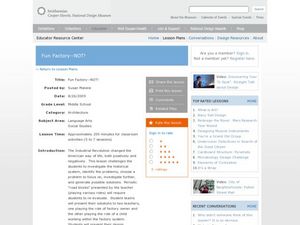Curated OER
The Birds of a Feather Flock Together
Fifth graders identify all parts of an egg, and explore their importance to the life cycle of a chicken. Learners compare all sorts of birds and place them in categories based on what they look like. This five-day lesson effectively...
Curated OER
Math in the Wetlands Field Trip
Get your class out in the environment for hands on math activities. In this wetlands lesson, learners transplant native plants, calculate how much soil is needed, and perform math activities based on this experience. They then make...
Cornell University
Classification
Explore the scientific method of classification. An interactive activity asks learners to create a classification system for a group of objects and develop a flow chart to communicate their systems. In addition, individuals use a...
Curated OER
Reading Comprehension 6
Set the timer for five minutes (or less), and distribute this resource to your class. There's a very short reading passage followed by a set of three questions. What a great tool in prepping your class for upcoming state testing.
Federal Reserve Bank
The Fed - Helping Keep Banks Safe and Sound
What does an examiner look for when analyzing a bank's financial condition? In addition to learning about the 5-Cs for reviewing loans and CAMELS (capital, assets, management, earnings, liquidity, and sensitivity to risk), your learners...
Earth Day Network
Filtering Water
See the water filtration system up close with a fun science experiment. Young scientists work for several class periods to design a water filter using household objects, and then decide which filter material would be most effective in...
Curated OER
Cross Sections and Collision Times
High schoolers solve five problems including finding the cross sectional area of two bodies, determining the swept out volume of a moving body, finding the average particle volume of a body and determining the collision time for a body.
Teach Engineering
Fluid Power Basics
What can bulldozers and screen doors have in common? Use this lesson on fluid power to find out. It begins with some simple teacher demonstrations, includes a couple of videos, and culminates with an inquiry-based activity to investigate...
NASA
Touchdown
Individuals design and build a set of shock absorbers to protect their astronauts when they land. Using a limited amount of supplies, pupils build a system that will keep two large marshmallows from flying out of a cup when it lands...
Chicago Botanic Garden
What Can Tree Rings Tell Us About Climate?
Tree rings are slightly thicker on the south side of the tree because it receives more sunlight. Part two in a series of five lessons helps learners analyze tree rings to determine the environmental conditions that caused size...
Bully Free Systems
Bully Free Lesson Plans—12th Grade
Two sample lessons from a curriculum unit on bullying provide high school seniors with an opportunity to assess their online and cell phone behavior and to consider how they can offer support to bullied students. Each plan includes an...
Serendip
Homeostasis, Negative Feedback, and Positive Feedback
So many bodily activities depend on homeostasis! Give learners a solid background to understand the basic process of the human body. Scholars first examine negative feedback loops contributing to body temperature regulation and then a...
02 x 02 Worksheets
Measuring Length
Your young forensic scientists add to and strengthen their measurement and conversion skills with these seven well-scaffold worksheets. Metric conversions, measuring length, area, and volume, reading thermometers, graduated cylinders,...
NASA
NASA: Moving Cargo
How does NASA transport people and cargo to planets? The five-lesson unit breaks down the transportation system that scientists use to transport cargo to space. Pairs team up in order to devise a transportation system that will carry the...
Curated OER
Fun with Fictitious Animals
How can one differentiate between a dweezlebub and nessie? Use this fictitious creature dichotomous key to find out! Biologists of all ages will enjoy this creative way to learn about classification, including a chance to draw the...
Curated OER
Underground Railroad/Quilts
Students explore the Underground Railroad communication system. In this cross curriculum fine arts and United States history Civil War lesson, students view several websites that feature quilts constructed by slaves during the...
K12 Reader
How Things Move
As part of a comprehension exercise, kids read a physical science article about motion and then answer a series of comprehension questions based on the passage.
Center for Civic Education
The Power of Nonviolence: Change Through Strategic Nonviolent Action
How did major historical figures, such as Henry David Thoreau, Susan B. Anthony, and Mohandas K. Gandhi, explain and defend their beliefs in nonviolence? Your learners will begin by studying the backgrounds of these individuals, and then...
Curated OER
Exploring Career Choices
Students complete a self-analysis exercise and choose a career to research based on the results. Students research their career using various resources including interview and internet research. They use the information gathered to...
Teach Engineering
Flow Rates of Faucets and Rivers
Go with the flow and use a helpful resource. A set of two activities has learners investigate flow rates. They first determine the flow rate of a faucet by measuring how long it takes to fill a bucket. Using the results, they make a...
Curated OER
Fun-Factory - NOT!
Students design a solution to a problem based on the Industrial Revolution. In this design lesson plan, students come up with architectural designs and present them to teachers in a simulated factory.
K12 Reader
Measuring Temperature
Fahrenheit? Celsius? What's the difference, and where did these two temperature scales originate? Your pupils will learn all about these topics by reading the passage included here. After reading, individuals respond to five questions...
Hawaiʻi State Department of Education
Angles on Kandinsky
Not only is Wassily Kandinsky fun to say, his art contains tons of angles. Learners discuss Kandinsky's music-inspired abstract art and four types of angles. They search one of his paintings for obtuse, right, straight, and acute angles,...
Virginia Department of Education
Mineral Identification
What's the difference between a rock and a mineral? And what properties are used to identify minerals? The first installment of a five-part series on earth materials and processes prompts young scientists to identify a set of...

























